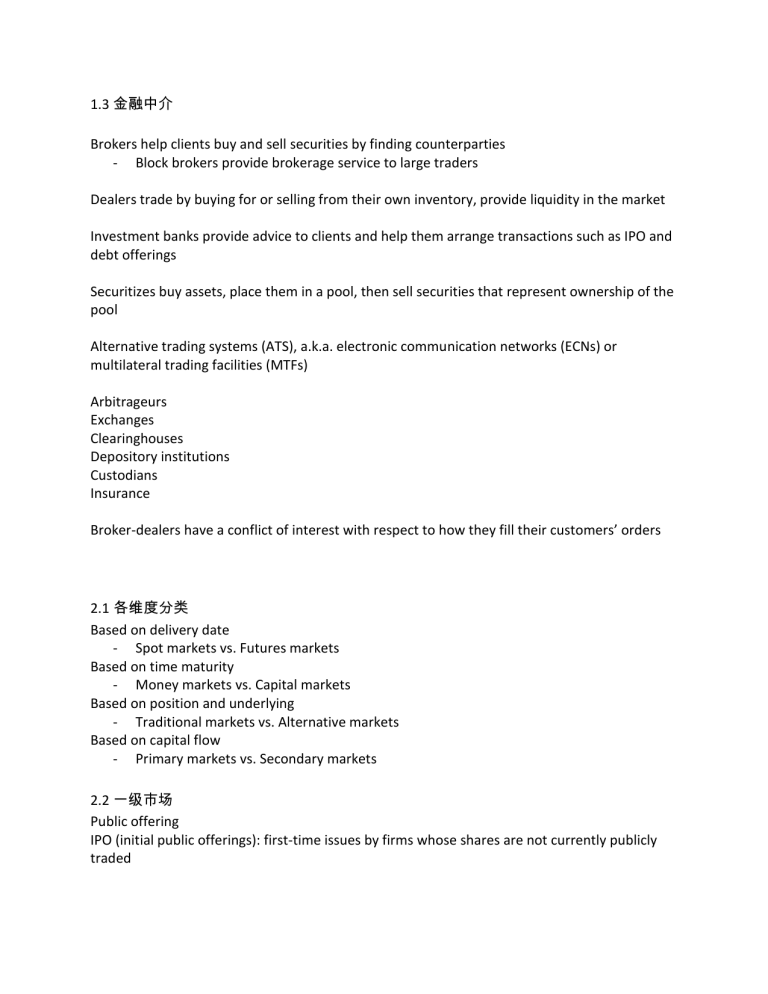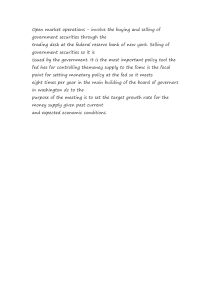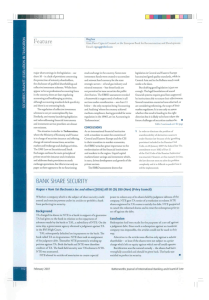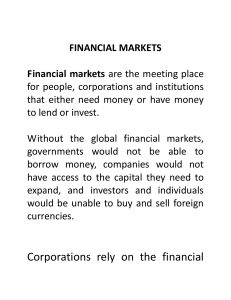
1.3 金融中介 Brokers help clients buy and sell securities by finding counterparties - Block brokers provide brokerage service to large traders Dealers trade by buying for or selling from their own inventory, provide liquidity in the market Investment banks provide advice to clients and help them arrange transactions such as IPO and debt offerings Securitizes buy assets, place them in a pool, then sell securities that represent ownership of the pool Alternative trading systems (ATS), a.k.a. electronic communication networks (ECNs) or multilateral trading facilities (MTFs) Arbitrageurs Exchanges Clearinghouses Depository institutions Custodians Insurance Broker-dealers have a conflict of interest with respect to how they fill their customers’ orders 2.1 各维度分类 Based on delivery date - Spot markets vs. Futures markets Based on time maturity - Money markets vs. Capital markets Based on position and underlying - Traditional markets vs. Alternative markets Based on capital flow - Primary markets vs. Secondary markets 2.2 一级市场 Public offering IPO (initial public offerings): first-time issues by firms whose shares are not currently publicly traded - Underwritten offering: investment bank guarantees the sale of the entire issue Best effort offering: investment bank acts only as broker, and is to buy the unsold portion if the issue is under-subscribed Seasoned offerings (secondary issues): new shares issued by firms whose share are already trading in the marketplace Private placement: corporations sell securities directly to a small group of qualified. Investors Shelf registration - Corporations sell new issues of seasoned securities directly into the secondary market when they need capital, and when the market is favorable Dividend reinvestment plan (DRPs) - Allow shareholders to reinvest their dividends in newly issued shares Rights offering 折扣价 - Shareholders are given the rights to buy new shares at a discount to the current market price 2.3 二级市场 Classified by trading session Call market 集合竞价市场 Definition: All order are gathered, a single price is chosen to maximize volume 成交量最大 Advantage: easier for buyers and sellers to find trading counterparty Disadvantage: Trade can only execute when market is open Continuous market 连续竞价 9 点半 Definition: Trades are arranged and executed anytime the market is open Advantage: Buyers and seller can trade at anytime as long as the market is open Disadvantage: if buyers and sellers arrive in the market at different time, they can not trade with each other Classified by trading mechanism 1. Quote-driven markets 报价驱动型 - Also known as price-driven markets, dealer markets - Customers trade at the prices quoted by dealers 2. Brokered markets 价格驱动 经纪人市场 - Brokers arrange trades among their clients - This service is valuable when a client has a unique or illiquid instrument for which finding a buyer or a seller willing to trade is difficult 流动性差 很难找到对手方 3. 1. 2. 3. - Order-driven markets Trades are arranged using rules to match buy orders to sell orders Order matching rules: establish an order precedence hierarchy Price priority Display precedence Time precedence Trading pricing rules: determine the price after orders are created using order matching rules o Uniform pricing rule o Discriminatory pricing rule o Derivative pricing rule 3.资产分类 Financial assets - Based on underlying characteristic Securities - Fixed-income: bonds, repos, CDs - Equity: common/preferred shares - Pooled investment vehicles: close/open-ended fund, ETFs Derivative contracts Based on whether trade publicly - Public securities - Private securities - Physical assets o Commodities: industrial metals, agricultural products - o Real assets: real estate, airplanes, machine Currencies 4.1 头寸的基本概念 Long positions benefit from an appreciation in the prices of the assets or contracts owned Short positions benefit from a decrease in the prices of the assets or contracts sold 4.2 融券卖空 Short selling I. Investor borrows stock and sells it II. Repurchases the stock and returns it to the lender (covers the short position) Unlike a long position, the protentional gains on a short position are limited to no more than 100 precent, whereas the potential losses are unlimited Short sellers must deposit the proceeds if the short sale with the security lenders as collateral Payments-in-lieu Short sellers pay the security lenders all dividends or interest that they otherwise would have received had they not lent their securities Security lenders invest the collateral in short-term securities and may return a portion of interest earned to short sellers






